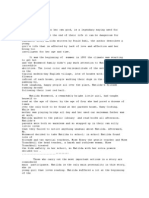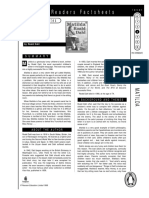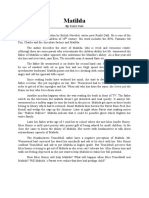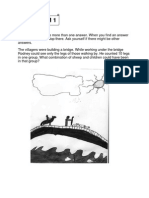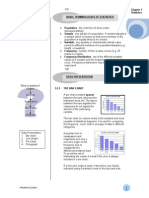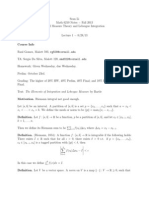Matilda
Matilda
Uploaded by
Maisah BhaCopyright:
Available Formats
Matilda
Matilda
Uploaded by
Maisah BhaOriginal Title
Copyright
Available Formats
Share this document
Read this document in other languages
Did you find this document useful?
Is this content inappropriate?
Copyright:
Available Formats
Matilda
Matilda
Uploaded by
Maisah BhaCopyright:
Available Formats
MATHILDA BY ROALD DAHL
Chapter Summaries The Reader of Books In this first chapter, we are reminded that some parents over-estimate the abilities of their children while others "show no interest at all" in theirs. (p. 10) It is here that we learn Mr. and Mrs. Wormwood are parents of the latter type. They are parents who were "so wrapped up in their silly little lives that they failed to notice anything unusual about their daughter." (p.10) It is then that we are introduced to little Matilda, and see just what the parents are missing. The narrator first and foremost describes Matilda as sensitive and brilliant - but above all, brilliant. Her abilities are wasting away in a home that values TV more than literature, and Matilda does not truly begin to thrive until she befriends the local librarian. Mrs. Phelps introduces Matilda to classical literature meant for readers far beyond her 4 1/2 years of age. The books transport Matilda "into new worlds and introduced her to amazing people who lived exciting lives." (p. 21) Perhaps it is this awakening which serves as the catalyst for a series of pranks Matilda plays on her family in the coming chapters.
What evidence do we have that suggests Matilda might be a child-genius? Give several examples to support the idea that Mr. and Mrs. Wormwood "looked upon Matilda in particular as nothing more than a scab." (p. 10)
Mr. Wormwood, the Great Car Dealer In this chapter, the reader is given additional insight about Matilda's parents and their character. Mr. Wormwood, though successful, is a dishonest salesman who regularly fills his customers' gear-boxes with sawdust and turns back the mileage. He is even quoted as saying, "No one ever got rich being honest. Customers are there to be diddled." (p.23) Mrs. Wormwood is depicted as a large woman with heavy makeup who prefers watching soap operas and playing Bingo to cooking or caring for her children. As a bit of foreshadowing, this chapter ends with the narrator revealing that Matilda had finally "decided that every time her father or her mother was beastly to her, she would get her own back in some way or another," and that "her father...was first on her list." (p. 29)
Why is putting sawdust in a gear-box or turning back the mileage on a car considered dishonest? On p. 29, the narrator says that "all the reading she (Matilda) had done had given her a view of life that the (her parents) had never seen." What does the narrator mean by this statement?
The Hat and the Superglue Matilda plays her first prank on her family by squeezing superglue inside the rim of the hat her father wears. As a result, his hat becomes glued to his head and he is unable to remove it.
Matilda believes it is "too much to hope that it had taught the father a permanent lesson." What does this mean, and do you agree with her?
The Ghost Matilda plays the second prank on her family. Using a friend's parrot she manages to convince her parents that there is a ghost in the house.
What two events led to Matilda's decision to play the second prank?
Arithmetic Here we see yet another example of just how briliant little Matilda really is as she completes difficult computations in her head. In keeping with his character, Matilda's father accuses her of being "cheat and a liar," (p. 55) instead of being impressed by her cleverness.
What does the narrator say is the only kind of power that Matilda has over her family? Why is this power important?
The Platinum-Blond Man Matilda plays another practical joke on her father with the aid of her mother's hair-dye.
Why did Matilda feel the need to retaliate this time? What does Matilda's mother say she will find out when she gets older? What does Roald Dahl mean by this comment?
Miss Honey Matilda enters school, and it is here that we are introduced to several other important figures in the story - Miss Trunchbull (the school's Headmistress), Miss Honey (Matilda's classroom teacher) and several of Matilda's classmates. We also learn more about Matilda's extordinary intellect. She is so advanced, that Miss Honey takes it upon herself to lobby for Matilda's advancement into a more compatible grade. In this chapter, she is met with resistence by Miss Trunchbull who, like Matilda's parents, prefers to believe the worst about the little girl.
Spend some time comparing and contrasting Miss Truchbull to Miss Honey.
The Parents Having not had any luck convincing Miss Trunchbull of Matilda's exceptional abiltiies and needs, she tries to approach Mr. and Mrs. Wormwood - but is met with similar disbelief and resisetence.
If you were a teacher, and had a student like Matilda, what would you do next?
Throwing the Hammer In this chapter, Matilda and her new friend Lavender meet a girl named Hortense, who is more than happy to relay the antics of their Headmistress. Then, they actually see her in action as she inflicts her own type of "discipline" on a student wearing pigtails.
What is the "Chokey"? What does "throwing the hammer" mean? Why is Miss Trunchbull good at it? Why doesn't someone put a stop to Miss Trunchbull's discipline tactics?
Bruce Bogtrotter and the Cake Miss Trunchbull strikes again! This time, the victim is 11-year old Bruch Bogtrotter. His crime? Eating some of Miss Trunchbull's special cake. This time, however, the student comes out on top!
Why is Bruce's victory an important turn of events in the story?
Lavender The students find out that Miss Trunchbull will be teaching in Miss Honey's classroom for the day and, after learning about Matilda's vengeance against her family, Lavender sees this as an opportunity to "become a heroine if only she could come up with a brilliant plot." (p. 136)
What is Lavender's "brilliant plot?" Why doesn't she share her plans with anyone?
The Weekly Test Miss Trunchbull discovers that Miss Honey has taught the students advanced spelling and math - which does not make Miss Trunchbull happy! As a result, Nigel, Rupert and Eric all suffer under the Headmistress.
How were all of the children able to learn to spell an advanced work like "difficulty?" What does that say about Miss Honey? What method does Miss Trunchbull prefer?
The First Miracle After Lavender's plot sends Miss Trunchbull into a rage against Matilda, we see the first indication that Matilda's powers go beyond just superior academic abilities! It appears that Matilda also has the power of psychokinesis.
What is Miss Trunchbull's idea of the "perfect" school? What is a "miracle?" Why do you think Roald Dahl titled this chapter "The First Miracle?"
The Second Miracle Matilda tries to convince Miss Honey that she was responsible for what happened when Miss Trunchbull was in the room. At first, Miss Honey does not believe her - so Matilda performs a second "miracle" to prove it.
The narrator says that Miss Honey looked at Matilda as if she were "The Creation, The Beginning of The World, The First Morning." (p. 176) What does the narrator mean by this?
Miss Honey's Cottage In this chapter, Miss Honey and Matilda talk of Matilda's new-found powers as they walk to the cottage where Miss Honey lives. During their visit inside the cottage, Matilda is surprised to see that her teacher lives such a simple life and pitys her a bit. The author provides a little foreshadowing near the end of the chapter, when he writes that Matilda felt, "There was something very strange going on around here," (p. 190) and then again when he writes, "There was a mystery here in this house, a great mystery, there was no doubt about that, and Matilda was longing to find out what it was." (p. 191)
What is "foreshadowing?" Make some predictions. What do you think the great mystery is?
Miss Honey's Story In this chapter, we learn more about Miss Honey, her background, why she lives the way she does and her unique relationship with Miss Trunchbull.
Look at the prediction you made after the last chapter. Was it correct? Why or why not?
The Names Matilda pushes Miss Honey for more information about her aunt and her father. Then, Matilda reveals that she may have a plan to help Miss Honey.
Miss Honey set out to help Matilda, and now it looks as though Matilda will be helping Miss Honey - instead. Now that you know the origin of the relationship between Miss Honey and Miss Trunchbull, make another prediction about how you think the Matilda book might end.
The Practice Matilda practices her powers to the point that she actually becomes quite good at controlling them.
Think about what you might do if you suddenly discovered you had powers, like Matilda. How would you practice?
The Third Miracle Miss Trunchbull is back teaching in the classroom. This time, the class tries to be wellprepared - but Miss Trunchbull tries to trick them. Just as Miss Trunchbull's anger begins to escalate, Matilda performs her third "miracle." What happens next is so frightening to Miss Trunchbull, that she actually collapses
Do you think Matilda will be in hot-water for what she has done to Miss Trunchbull? What evidence do you have from the story to support your answer?
A New Home Miss Trunchbull disappears, and the will of Miss Honey's late father suddenly has resurfaced. We see that Miss Honey is not poor after all. As things change at the school for the better, Matilda finds that her powers have suddenly disappeared, and Miss Honey offers an explanation as to why. Mr. Wormwood is found out to be a crook, and the family prepares to leave the country - but Matilda and Miss Honey have other plans!
This chapter could be called "The New Home" for several reasons. What are they?
MATHILDA BY ROALD DAHL THEMES The parents of five-and-a-half-year-old maltda womwood have no interest in their daughter, but if they did, they would discover that she is incredibly gifted. Matilda learned to read at age 3, though the only actual book in the house was a cookbook and magazines. When she asks for a real book for herself, her father rudely turns her down and tells her to watch television instead. In spite of this, Matilda looks up the address of the local library, and when everyone else leaves the house she walks to the library and quickly impresses the librarian with her thirst for literature, finishing all the children's books within a short time. The librarian gives Matilda her own library card, and she is able to bring books home with her to enjoy. Mr. Wormwood sells used for a living and after taking Matilda and her brother Michael to work one day, shows them he makes a handsome profit by cheating customers (putting sawdust in the transmission, rolling back the mileage on the odometer and gluing the bumpers and fenders that have fallen off). Matilda accuses him of being a crook though he shrugs it off and insults her. Matilda resolves to teach her parents a lesson everytime they do something wrong. She puts superglue on her father's hat, forcing him to cut it off his own hair, adds some of her mother's hair dye to the oil her father puts in his hair, dyeing it an atrocious color, and "borrows" a parrot belonging to a friend next door and hides it up the chimney; when it talks, the family is frightened into believing the house is haunted by a ghost and run out of the house, terrified. Matilda's father sells a car to Miss Agatha Trunchbull, the principal of Crunchem Hall, a private school. He arranges with Miss Trunchbull to have Matilda attend the school, where she impresses her teacher, Miss Jennifer "Jenny" Honey, with her amazing intellectual capacity and mathematical abilityMiss Honey appeals to Miss Trunchbull to have Matilda moved up into an advanced class, but the child-hating Miss Trunchbull refuses. Miss Honey also tries, in vain, to reason with Mr. and Mrs. Wormwood, but she is not welcomed, and both parents make it clear that they are not interested either in Matilda or the vale of learingand learning. Matilda quickly learns of the Trunchbull's capacity r punishing children, as she sees the Trunchbull forces a boy to eat an entire chocolate cake in front of the school for stealing some of hers, throws a girl over a fence by her pigtails because students are not allowed to have them and other cruelties for minor reasons. When one of Matilda's friends, Lavender, places a newt in the Trunchbull's glass of water during a classroom inspection, the Trunchbull blames Matilda and refuses to listen to her. Incensed by the Trunchbull's injustice, Matilda focuses on the glass and surprises everyone by tipping it over right on to Miss Trunchbull. When the day ends, Matilda is able to prove to Miss Honey that she really did make the glass move and Miss Honey invites her to her house for some tea. Along the way, she tells Matilda her story--Miss Trunchbull is actually her aunt, who took over her father's home and abused her after her father, Magnus, supposedly killed himself. Miss Honey was able to escape and rent the cottage, though is still as dominated by the Trunchbull's tyranny as the other children at school. Matilda secretly intends to resolve this by working on her newfound powers. After
practicing and waiting for a day when the Trunchbull returns to the classroom, she "haunts" the class as Magnus' ghost, writing a threatening message for the Trunchbull on the chalkboard that tells her to give Miss Honey back her home and money and leave for good. The terrified Miss Trunchbull does so, never to be seen by anyone again. Matilda visits Miss Honey in her new home often, but returns home one afternoon to find her parents packing everything they have into the car--the police had apparently discovered some of Mr. Wormwood's covert illegal activity and now the whole family is moving out of the country. Miss Honey comes with Matilda and stands up to the Wormwoods. Matilda begs to let her stay with Miss Honey, which they do so without a second glance back at her (although her brother waves goodbye).
SETTING In the first chapter, it is revealed that Matilda lives in a little "English village." (p. 21) Although the village is never named, we do learn from Matilda that her mother likes to play Bingo in Aylesbury. (p. 16) Later in the story, Matilda's teacher tells Matilda that she attended a "Teacher's Training College in Reading," which is only "forty minutes' bus-ride away" from the village where they are living now. (p.200) There are five main locations within the story: The village library, the Wormwood's home, the school, Miss Honey's cottage and the home of the school's headmistress.
PLOT Matilda is a young child-genius who has the misfortune of living with parents and an older brother who care neither for her nor her unique abilities. Instead, their only focus is watching the television, playing Bingo or cheating others. Interactions with the local librarian introduces Matilda to the possibility of emotional escape through the world of books. Matilda's true powers are not fully realized until she befriends the kind and lovely Miss Honey, her teacher at the Crunchem Hall Primary School. At the school, Matilda encounters a memorable cast of characters, including classmates Lavendar and Hortensia and the bullish Headmistress - Miss Trunchbull. Readers will be entertained by Matilda's antics as she tries to punish those who constantly ignore or belittle her. Matilda, by Roald Dahl, is truly an enjoyable read for all who encounter it. In the next article of the series, we will take a close look at the Matilda characters
CHARACTER MATHILDA (Main and Protagonist Character) A cleaver girl. Fast in learning. Like to read book. The daughter of Mr. Wormwood and Mrs. Wormwood. Have one brother named Michael. enters Crunchem Hall Primary School she is 5 1/2-years old. possesses the powers of psychokinesis (the ability to move things with her mind) and it is implied that these powers are a result of the repressed anger she feels toward her parents and Headmistress who vacillate between ignoring and belittling her
MR. HARRY WORMWOOD (Antagonist Character) Father of Mathilda and Michael. Husband to Mrs. Wormwood. Work as a car dealer. Very tricky person. A thin person in size. dishonest business man.
MRS. WORMWOOD(Antagonist Character) Not responsible mother. A large woman with hair that dyed platinum blonde. Wife to Mr. Wormwood. Have bad attitude like her husband. Always support her husband. Wore heavy make-up. only interests in watching American soap-operas and playing Bingo every day thinks very little of her daughter's unique abilities and often berates her.
MICHEAL
The son of Mr. and Mrs. Wormwood. Brother to Mathilda. Normal boy. Follow the parent order and life style. the favorite in the Wormwood household
MRS. PHELPS(Minor Character) the local librarian who encourages Matilda's love of reading.
FRED(Minor Character) A friend of Mathilda. A small boy of 6 years old. Live around the corner from Mathilda. Get a great talking parrot from his father.
MISS JENNIFER HONEY Matilda's teacher at Crunchem Hall Primary School. A young, pretty, mild-mannered and possessed that rare gift for being adored by every small child under her care. (p. 67) Later in the story, she becomes a great advocate for Matilda.
MISS TRUCHBULL undoubtedly the most colourful in the cast of Matilda characters. The Headmistress at Crunchem Hall Primary School. Miss Trunchbull serves as the "head teacher, the boss and the supreme commander" (p. 66) who "insists on strict discipline throughout the school." (p. 69) She also describes her as a "gigantic holy terror, a fierce tyrannical monster who frightened the life out of the pupils and teachers alike" (p. 67) who "hardly ever spoke in a normal voice." (p. 85) Instead, he says she "barked or shouted." (p. 85) Her favourite form of punishment is to send students to the "Chocky," which is a "very tall but very narrow cupboard" that has a floor "only ten inches square so you can't sit down or squat in it" - forcing one to stand, instead. Furthermore, "three of the walls are made of cement with bits of broken glass sticking out all over, so you can't
lean against them." Leaning against the door is also impossible, because it has "thousands of sharp spikey nails sticking out of it." (p. 104) Miss Trunchbull is also Miss Honey's aunt Agatha.
LAVENDER, NIGEL, RUPPER, ERIC, WILFRED AND HORSTENSIA Matilda's friends and classmates at Crunchem Hall Primary School.
AMANDA THRIPP another classmate of Mathilda. She makes the mistake of coming to school wearing her hair in pigtails. Miss Trunchbull despises pigtails, and so she uses them to pick Amanda up. Using her Olympic hammer training, Miss Trunchbull swings Amanda around over-head and throws her clear across the school yard fence. Luckily, she "landed on the grass and bounced three times and finally came to rest." (p. 116)
BRUCE BOGTROTTER another of Matilda's classmates who suffers under Miss Trunchbull. This 11-year old boy commits the crime of sneaking a piece of the Headmistresses' "special" chocolate cake. During his confession, Bruce admits that he found the cake, baked by the school's cook, to be "very good." (pp. 122-123) As his punishment, Bruce is forced to eat every last bite of a duplicate cake which was "fully eighteen inches in diameter" and "covered with dark-brown chocolate icing." (p. 124)
MR. TRIBLY TheDeputy Head of the school who, at the end of the book, is appointed Head Teacher in Miss Trunchbull's place.
MISS PLIMSOLL Matilda's teacher once she is moved to a higher grade at the school.
LITTERARY TERMS Allegory A symbolic narrative in which the surface details imply a secondary meaning. Allegory often takes the form of a story in which the characters represent moral qualities. The most famous example in English is John Bunyan's Pilgrim's Progress, in which the name of the central character, Pilgrim, epitomizes the book's allegorical nature. Kay Boyle's story "Astronomer's Wife" and Christina Rossetti's poem "Up-Hill" both contain allegorical elements. Alliteration The repetition of consonant sounds, especially at the beginning of words. Example: "Fetched fresh, as I suppose, off some sweet wood." Hopkins, "In the Valley of the Elwy." Antagonist A character or force against which another character struggles. Creon is Antigone's antagonist in Sophocles' play Antigone; Teiresias is the antagonist of Oedipus in Sophocles'Oedipus the King. Assonance The repetition of similar vowel sounds in a sentence or a line of poetry or prose, as in "I rose and told him of my woe." Whitman's "When I Heard the Learn'd Astronomer" contains assonantal "I's" in the following lines: "How soon unaccountable I became tired and sick, / Till rising and gliding out I wander'd off by myself." Character An imaginary person that inhabits a literary work. Literary characters may be major or minor, static (unchanging) or dynamic (capable of change). In Shakespeare's Othello, Desdemona is a major character, but one who is static, like the minor character Bianca. Othello is a major character who is dynamic, exhibiting an ability to change. Characterization The means by which writers present and reveal character. Although techniques of characterization are complex, writers typically reveal characters through their speech, dress, manner, and actions. Readers come to understand the character Miss Emily in Faulkner's story "A Rose for Emily" through what she says, how she lives, and what she does. Climax The turning point of the action in the plot of a play or story. The climax represents the point of greatest tension in the work. The climax of John Updike's "A&P," for example, occurs when Sammy quits his job as a cashier. Complication An intensification of the conflict in a story or play. Complication builds up, accumulates, and develops the primary or central conflict in a literary work. Frank O'Connor's story "Guests of the Nation" provides a striking example, as does Ralph Ellison's "Battle Royal." Conflict A struggle between opposing forces in a story or play, usually resolved by the end of the work. The conflict may occur within a character as well as between characters. Lady Gregory's one-act play The Rising of the Moon exemplifies both types of conflict as the Policeman wrestles with his conscience in an inner conflict and confronts an antagonist in the person of the ballad singer. Connotation The associations called up by a word that goes beyond its dictionary meaning. Poets, especially, tend to use words rich in connotation. Dylan Thomas's "Do Not Go Gentle into That Good Night" includes intensely connotative language, as in these lines: "Good men, the last wave by, crying how bright / Their frail deeds might have danced in a green bay, / Rage, rage against the dying of the light."
The unified structure of incidents in a literary work. See Conflict, Climax, Denouement, andFlashback. Point of view The angle of vision from which a story is narrated. See Narrator. A work's point of view can be: first person, in which the narrator is a character or an observer, respectively; objective, in which the narrator knows or appears to know no more than the reader; omniscient, in which the narrator knows everything about the characters; and limited omniscient, which allows the narrator to know some things about the characters but not everything. Protagonist The main character of a literary work--Hamlet and Othello in the plays named after them, Gregor Samsa in Kafka's Metamorphosis, Paul in Lawrence's "Rocking-Horse Winner." Recognition The point at which a character understands his or her situation as it really is. Sophocles' Oedipus comes to this point near the end of Oedipus the King; Othello comes to a similar understanding of his situation in Act V of Othello. Resolution The sorting out or unraveling of a plot at the end of a play, novel, or story. See Plot. Reversal The point at which the action of the plot turns in an unexpected direction for the protagonist. Oedipus's and Othello's recognitions are also reversals. They learn what they did not expect to learn. See Recognition and also Irony. Rising action A set of conflicts and crises that constitute the part of a play's or story's plot leading up to the climax. See Climax, Denouement, and Plot. Satire A literary work that criticizes human misconduct and ridicules vices, stupidities, and follies. Swift's Gulliver's Travels is a famous example. Chekhov's Marriage Proposal and O'Connor's "Everything That Rises Must Converge," have strong satirical elements. Setting The time and place of a literary work that establish its context. The stories of Sandra Cisneros are set in the American southwest in the mid to late 20th century, those of James Joyce in Dublin, Ireland in the early 20th century. Simile A figure of speech involving a comparison between unlike things using like, as, or as though. An example: "My love is like a red, red rose." Style The way an author chooses words, arranges them in sentences or in lines of dialogue or verse, and develops ideas and actions with description, imagery, and other literary techniques. See Connotation, Denotation, Diction, Figurative language, Image, Imagery, Irony, Metaphor, Narrator, Point of view, Syntax, and Tone. Subject What a story or play is about; to be distinguished from plot and theme. Faulkner's "A Rose for Emily" is about the decline of a particular way of life endemic to the American south before the civil war. Its plot concerns how Faulkner describes and organizes the actions of the story's characters. Its theme is the overall meaning Faulkner conveys. Subplot A subsidiary or subordinate or parallel plot in a play or story that coexists with the main plot. The story of Rosencrantz and Guildenstern forms a subplot with the overall plot ofHamlet.
Understatement A figure of speech in which a writer or speaker says less than what he or she means; the opposite of exaggeration. The last line of Frost's "Birches" illustrates this literary device: "One could do worse than be a swinger of birches."
You might also like
- Matilda The Musical in 40 MinutesDocument10 pagesMatilda The Musical in 40 MinutesCarlos Casanova100% (5)
- Matilda Script FINAL FINAL!!Document22 pagesMatilda Script FINAL FINAL!!Bautista Shermine50% (4)
- 2022 CAT Questions and Solutions For All DivisionsDocument62 pages2022 CAT Questions and Solutions For All DivisionskirtiNo ratings yet
- Matilda Script PlayDocument7 pagesMatilda Script PlayRafael Landriel0% (1)
- Matilda SummaryDocument9 pagesMatilda SummaryMary Rose Jalipa100% (2)
- Physics Grade 11-1Document44 pagesPhysics Grade 11-1AlikeNo ratings yet
- Analysis of Matilda by Roald DahlDocument5 pagesAnalysis of Matilda by Roald DahlKyle Medina100% (1)
- Matilda EssayDocument3 pagesMatilda Essaysingingman100% (3)
- MATILDA by Roald DahlDocument12 pagesMATILDA by Roald DahlOrange Humaira0% (1)
- Matilda: Penguin Readers FactsheetsDocument4 pagesMatilda: Penguin Readers Factsheetsannacho1109100% (7)
- Concept of GMD and GMRDocument4 pagesConcept of GMD and GMRyethwe100% (2)
- MatildaDocument4 pagesMatildaminervaminervaNo ratings yet
- The Wizard of OzDocument31 pagesThe Wizard of OzIlMi ChungNo ratings yet
- Peter PanDocument5 pagesPeter PanAyu RoseNo ratings yet
- The Tale of Peter Rabbit: Role-PlayDocument2 pagesThe Tale of Peter Rabbit: Role-PlaySarah KhanNo ratings yet
- MatildaDocument8 pagesMatildasachin15040% (1)
- MatildaDocument6 pagesMatildaAnali Roxana Pacoticona MamaniNo ratings yet
- Book ReviewDocument5 pagesBook ReviewJohn Carlo Delos ReyesNo ratings yet
- MatildaDocument4 pagesMatildaJonalyn de CastroNo ratings yet
- MatildaDocument1 pageMatildavijayNo ratings yet
- Matlida by Roald Dahl Story _ Summary and Resources - TwinklDocument11 pagesMatlida by Roald Dahl Story _ Summary and Resources - Twinklvarana777No ratings yet
- Matilda by Roald Dahl (Book Analysis): Detailed Summary, Analysis and Reading GuideFrom EverandMatilda by Roald Dahl (Book Analysis): Detailed Summary, Analysis and Reading GuideNo ratings yet
- Book Report in English 8 - 20240102 - 090614 - 0000 PDFDocument11 pagesBook Report in English 8 - 20240102 - 090614 - 0000 PDFLexie FernandezNo ratings yet
- Matilda CharactersDocument2 pagesMatilda CharactersSolehah RoslanNo ratings yet
- MatildaDocument6 pagesMatildaMartin Michalko100% (1)
- MatildaDocument1 pageMatildaapi-145664870No ratings yet
- MATILDA The MusicalDocument3 pagesMATILDA The MusicalAdelio Balmez0% (1)
- MATILDADocument6 pagesMATILDATSLB-0619 Muhammad Aiman Bin Che YusoffNo ratings yet
- Book Report: by Katherine KuDocument5 pagesBook Report: by Katherine KuRose MockingjayNo ratings yet
- Roald DahlDocument22 pagesRoald DahlShaliny LinnieNo ratings yet
- Matilda Do Either The Odd or Even Numbered QuestionsDocument2 pagesMatilda Do Either The Odd or Even Numbered Questionsandream_19100% (1)
- Matilda PresentationDocument34 pagesMatilda PresentationShoaib Naeem100% (1)
- Matilda Review Almost FixDocument7 pagesMatilda Review Almost FixFun EnglishNo ratings yet
- MATILDADocument2 pagesMATILDAmanhacode245No ratings yet
- Chapter 1-3 - Matilda - T:F - Answer Key VIBGYOR STUDENT HELPDocument2 pagesChapter 1-3 - Matilda - T:F - Answer Key VIBGYOR STUDENT HELPAdvait Abraham AbhilashNo ratings yet
- Summary of Matilda by Roald DahlDocument3 pagesSummary of Matilda by Roald Dahlstu745701009No ratings yet
- Matilda AnalysisDocument13 pagesMatilda AnalysisAnthony Dunkley100% (1)
- Matilda BoekverslagDocument3 pagesMatilda BoekverslagSanne HofmanNo ratings yet
- Teacher's Notes MatildaDocument3 pagesTeacher's Notes MatildaChristian Urbe100% (1)
- Roald Dahl: Lifestory and BooksDocument2 pagesRoald Dahl: Lifestory and Booksblueblaze1988No ratings yet
- Mathilda - Character (EN)Document7 pagesMathilda - Character (EN)Maxi the SingerNo ratings yet
- MatildaDocument1 pageMatildaWaqasNo ratings yet
- Brief Background of MatildaDocument3 pagesBrief Background of MatildaStephiel SumpNo ratings yet
- Matilda - Full Book Summary - SparkNotesDocument3 pagesMatilda - Full Book Summary - SparkNotesekinsufrt1177No ratings yet
- Carroll Melissa Book Movie ComparisonDocument4 pagesCarroll Melissa Book Movie ComparisonMelissa CarrollNo ratings yet
- Guió anglèsDocument1 pageGuió anglèspaularebollogabrielNo ratings yet
- The Excerpt Is From Matilda by Roald DahlDocument1 pageThe Excerpt Is From Matilda by Roald DahlAdriana Gonzales IncioNo ratings yet
- AssigmentDocument5 pagesAssigmentbisphotocopy786No ratings yet
- Matilda PowerPoint Part 1Document17 pagesMatilda PowerPoint Part 1VIVAANNo ratings yet
- Libreto MatildaDocument24 pagesLibreto MatildaAlexia Funes De MorenoNo ratings yet
- MATILDADocument3 pagesMATILDAJay R ChivaNo ratings yet
- Character Sketch of MatildaDocument1 pageCharacter Sketch of MatildaitzmidnightharshalplayzNo ratings yet
- Roald Dahl DESCRIPTIONDocument2 pagesRoald Dahl DESCRIPTIONKhairin FitriNo ratings yet
- Matilda Can Do MagicDocument2 pagesMatilda Can Do MagicW1z Ard100% (3)
- Because I Can with Roald Dahl's Matilda : Miss TrunchbullFrom EverandBecause I Can with Roald Dahl's Matilda : Miss TrunchbullNo ratings yet
- Because I Can with Roald Dahl's Matilda: Daughter Mother RelationshipsFrom EverandBecause I Can with Roald Dahl's Matilda: Daughter Mother RelationshipsNo ratings yet
- Rezumat Matilda+ Little WomenDocument1 pageRezumat Matilda+ Little WomenaveragejesterNo ratings yet
- Answers QADocument20 pagesAnswers QAjbisenioNo ratings yet
- Matilda Summary and AnalysisDocument19 pagesMatilda Summary and AnalysisStephiel Sump100% (1)
- MR PipDocument2 pagesMR Pipbelleamie1No ratings yet
- Book ReviewDocument2 pagesBook ReviewAadya GastgarNo ratings yet
- ProblemsDocument18 pagesProblemsMaisah BhaNo ratings yet
- The Birthday ParadoxDocument4 pagesThe Birthday ParadoxMaisah BhaNo ratings yet
- Coordinate GeometryDocument20 pagesCoordinate GeometryMaisah Bha100% (1)
- Abdullah HassanDocument1 pageAbdullah HassanMaisah BhaNo ratings yet
- Squash Service TypesDocument21 pagesSquash Service TypesMaisah BhaNo ratings yet
- Chapter 2 Area For Irregular ShapeDocument8 pagesChapter 2 Area For Irregular ShapeMaisah Bha100% (1)
- Chapter 1 StatisticsDocument26 pagesChapter 1 StatisticsMaisah BhaNo ratings yet
- Format of Summer Internship Training Project ReportDocument11 pagesFormat of Summer Internship Training Project Reportsoumyasingh2tNo ratings yet
- Guide To Using Excel 2007 For Basic Statistical ApplicationsDocument19 pagesGuide To Using Excel 2007 For Basic Statistical Applicationsankur panwarNo ratings yet
- Dy DX X +xy+y X Dy DX X+3y X yDocument3 pagesDy DX X +xy+y X Dy DX X+3y X yDaniel DicksonNo ratings yet
- BSC 5 Sem Physics p6 Classical Mechanics and Solid State Physics Mar 2023Document3 pagesBSC 5 Sem Physics p6 Classical Mechanics and Solid State Physics Mar 2023rahulteli2021No ratings yet
- Analytical Method ValidationDocument86 pagesAnalytical Method ValidationRambabu komati - QA100% (12)
- Exercise # 1:: Investigate The Effect of The Following Commands: A) V (2) & B) Sum V+WDocument12 pagesExercise # 1:: Investigate The Effect of The Following Commands: A) V (2) & B) Sum V+WVikram singhNo ratings yet
- Full Download Proceedings of The 11th National Technical Seminar On Unmanned System Technology 2019 NUSYS 19 Zainah MD Zain PDFDocument62 pagesFull Download Proceedings of The 11th National Technical Seminar On Unmanned System Technology 2019 NUSYS 19 Zainah MD Zain PDFxeddolaller100% (4)
- Process Plant Design: Modeling Simulation and OptimizationDocument18 pagesProcess Plant Design: Modeling Simulation and Optimizationdjona lokimaNo ratings yet
- Math 9 DLL Q2 W1 D2Document3 pagesMath 9 DLL Q2 W1 D2Joy GeronimoNo ratings yet
- AI PROJECT CYCLE Data ModellingDocument18 pagesAI PROJECT CYCLE Data Modellingmithu_facNo ratings yet
- Mastering OpenCV Android Application Programming - Sample ChapterDocument27 pagesMastering OpenCV Android Application Programming - Sample ChapterPackt PublishingNo ratings yet
- Ch06solution ManualDocument26 pagesCh06solution ManualStoneCold Alex Mochan100% (4)
- Borromean Rings, Seed of Life Rings, and Borromean Tubes-Activate Higher Spiritual EnergyDocument6 pagesBorromean Rings, Seed of Life Rings, and Borromean Tubes-Activate Higher Spiritual EnergyPreeti KumariNo ratings yet
- Map1.map of NepalDocument1 pageMap1.map of NepalGopi Raj PunNo ratings yet
- Math 6210 Lec 01Document3 pagesMath 6210 Lec 01Sean LiNo ratings yet
- Ijerph 19 05215Document19 pagesIjerph 19 05215Thành DuyNo ratings yet
- Compound InterestDocument22 pagesCompound InterestAnonymous rDNAiszDjX100% (1)
- Prof. Januario Flores JRDocument14 pagesProf. Januario Flores JRzamora pegafiNo ratings yet
- sequences-8mFpT7Kw75ggYwzBDocument34 pagessequences-8mFpT7Kw75ggYwzBQais AbuhantashNo ratings yet
- Grima&Wypych-Discrete Element Simulation Validation Impact Plate Transfer StationDocument18 pagesGrima&Wypych-Discrete Element Simulation Validation Impact Plate Transfer StationJoaquín NarváezNo ratings yet
- P vs. NP - An IntroductionDocument2 pagesP vs. NP - An IntroductionK AnneNo ratings yet
- Assignment #1Document1 pageAssignment #1DechenPemaNo ratings yet
- MathsDocument6 pagesMathsSahithaNo ratings yet
- Fiitjee AitsDocument16 pagesFiitjee AitsVinay MittalNo ratings yet
- Properties of Natural GasDocument67 pagesProperties of Natural Gasxion_mew2No ratings yet
- PoF Formulae and GraphsDocument4 pagesPoF Formulae and GraphsDiego CarraraNo ratings yet
- Pipe Flow: Philosophy, Sizing, and Simulation: Presenter: RizaldiDocument55 pagesPipe Flow: Philosophy, Sizing, and Simulation: Presenter: RizaldiRizaldi RizNo ratings yet







